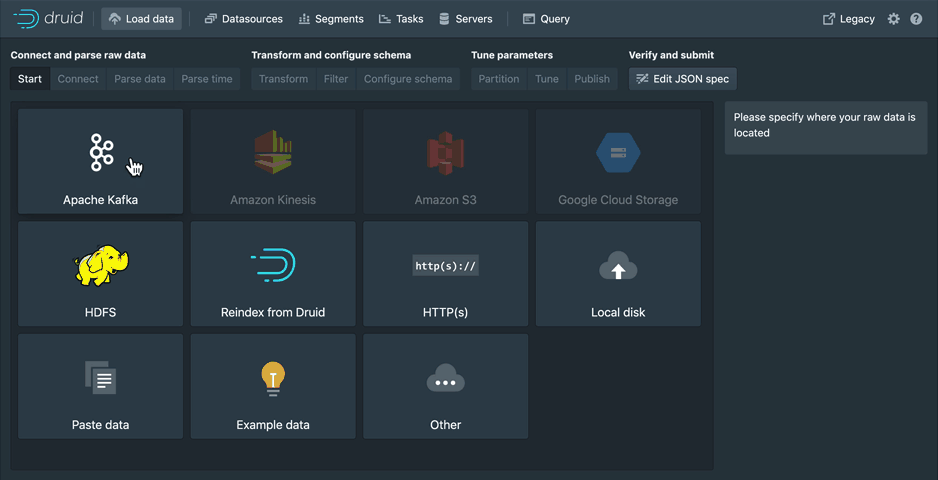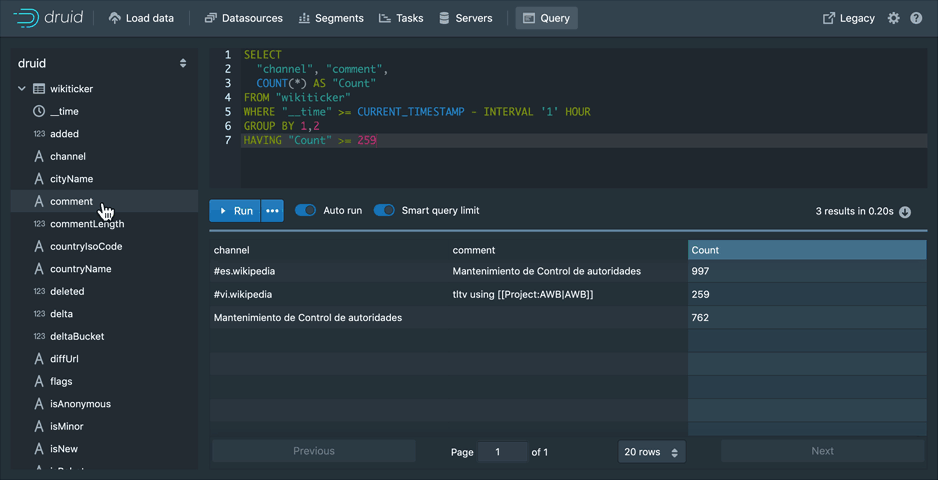* DruidInputSource: Fix issues in column projection, timestamp handling.
DruidInputSource, DruidSegmentReader changes:
1) Remove "dimensions" and "metrics". They are not necessary, because we
can compute which columns we need to read based on what is going to
be used by the timestamp, transform, dimensions, and metrics.
2) Start using ColumnsFilter (see below) to decide which columns we need
to read.
3) Actually respect the "timestampSpec". Previously, it was ignored, and
the timestamp of the returned InputRows was set to the `__time` column
of the input datasource.
(1) and (2) together fix a bug in which the DruidInputSource would not
properly read columns that are used as inputs to a transformSpec.
(3) fixes a bug where the timestampSpec would be ignored if you attempted
to set the column to something other than `__time`.
(1) and (3) are breaking changes.
Web console changes:
1) Remove "Dimensions" and "Metrics" from the Druid input source.
2) Set timestampSpec to `{"column": "__time", "format": "millis"}` for
compatibility with the new behavior.
Other changes:
1) Add ColumnsFilter, a new class that allows input readers to determine
which columns they need to read. Currently, it's only used by the
DruidInputSource, but it could be used by other columnar input sources
in the future.
2) Add a ColumnsFilter to InputRowSchema.
3) Remove the metric names from InputRowSchema (they were unused).
4) Add InputRowSchemas.fromDataSchema method that computes the proper
ColumnsFilter for given timestamp, dimensions, transform, and metrics.
5) Add "getRequiredColumns" method to TransformSpec to support the above.
* Various fixups.
* Uncomment incorrectly commented lines.
* Move TransformSpecTest to the proper module.
* Add druid.indexer.task.ignoreTimestampSpecForDruidInputSource setting.
* Fix.
* Fix build.
* Checkstyle.
* Misc fixes.
* Fix test.
* Move config.
* Fix imports.
* Fixup.
* Fix ShuffleResourceTest.
* Add import.
* Smarter exclusions.
* Fixes based on tests.
Also, add TIME_COLUMN constant in the web console.
* Adjustments for tests.
* Reorder test data.
* Update docs.
* Update docs to say Druid 0.22.0 instead of 0.21.0.
* Fix test.
* Fix ITAutoCompactionTest.
* Changes from review & from merging.
Website | Documentation | Developer Mailing List | User Mailing List | Slack | Twitter | Download
Apache Druid
Druid is a high performance real-time analytics database. Druid's main value add is to reduce time to insight and action.
Druid is designed for workflows where fast queries and ingest really matter. Druid excels at powering UIs, running operational (ad-hoc) queries, or handling high concurrency. Consider Druid as an open source alternative to data warehouses for a variety of use cases.
Getting started
You can get started with Druid with our local or Docker quickstart.
Druid provides a rich set of APIs (via HTTP and JDBC) for loading, managing, and querying your data. You can also interact with Druid via the built-in console (shown below).
Load data
Load streaming and batch data using a point-and-click wizard to guide you through ingestion setup. Monitor one off tasks and ingestion supervisors.
Manage the cluster
Manage your cluster with ease. Get a view of your datasources, segments, ingestion tasks, and services from one convenient location. All powered by SQL systems tables, allowing you to see the underlying query for each view.
Issue queries
Use the built-in query workbench to prototype DruidSQL and native queries or connect one of the many tools that help you make the most out of Druid.
Documentation
You can find the documentation for the latest Druid release on the project website.
If you would like to contribute documentation, please do so under
/docs in this repository and submit a pull request.
Community
Community support is available on the druid-user mailing list, which is hosted at Google Groups.
Development discussions occur on dev@druid.apache.org, which you can subscribe to by emailing dev-subscribe@druid.apache.org.
Chat with Druid committers and users in real-time on the #druid channel in the Apache Slack team. Please use this invitation link to join the ASF Slack, and once joined, go into the #druid channel.
Building from source
Please note that JDK 8 is required to build Druid.
For instructions on building Druid from source, see docs/development/build.md
Contributing
Please follow the community guidelines for contributing.
For instructions on setting up IntelliJ dev/intellij-setup.md







